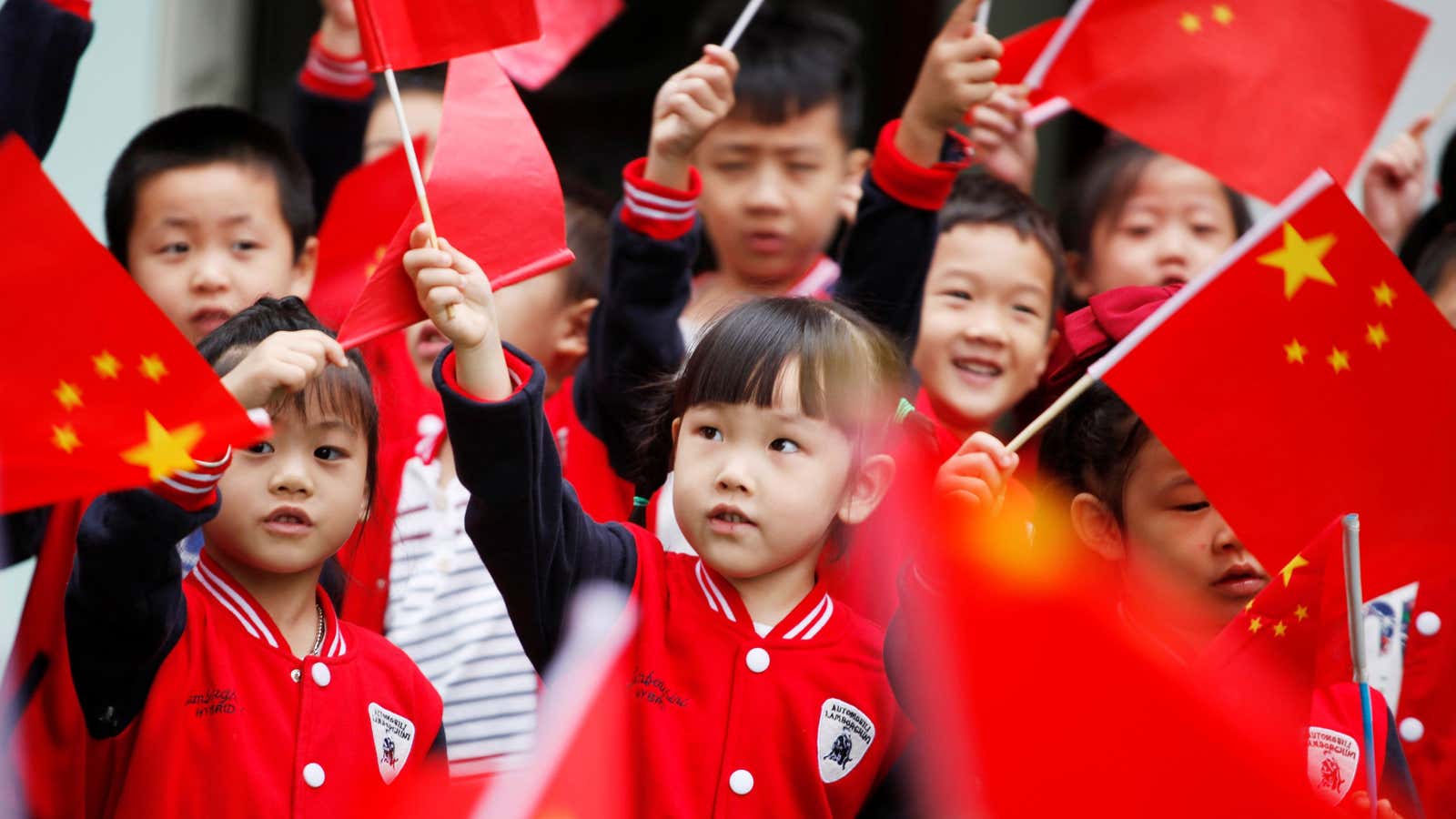TikTok is trying hard to shape its image as an international app. But a satirical meme that took off around April revolves around poking fun at the app’s Chinese roots—and at China itself.
Hundreds of videos “praising” China and its president Xi Jinping have been posted on the app by users mainly in the US and Europe, set to the tune of the Chinese national anthem. With the Chinese national flag and an image of Xi in the background, the teens pretend to interact with the Chinese leader, giving him a kiss on the cheek or raising a toast together.
Some of the users say that they’re making these over-the-top videos because they believe they have been shadow banned or to get featured on the app’s “For You” feeds—TikTok’s personalized recommendations for users. Shadow banning is a practice believed to be deployed by many social media platforms to reduce the visibility of a post or even stop it from being seen by other users, without the uploader being aware of the ban as they can still post freely. By posting these videos, often hashtagged #ilovechina, the thinking among some is that they will gain views and followers since China is the home base of TikTok’s parent ByteDance, the world’s most valuable startup.
But for many of the creators, it’s basically a joke.
“My views were going down so I wanted to see if a video that praises China would do well in the algorithm and oddly enough it did,” Matt Norris, a 19-year-old TikTok user in the US, told Quartz. Norris, who has about 9,000 followers on the app, saw his China video—in which he says things like, “I love China… Xi Jinping is my bff” in fluent Mandarin—become one of his most popular clips.
Norris said he created the video, posted on April 12, mainly to “reflect on” Chinese propaganda, although he says there are probably some people who genuinely think that posting such content will help increase their visibility on the app. Some users have added the #ilovechina hashtag to videos that have nothing to do with China, perhaps because it has garnered nearly 50 million views as of Thursday (May 28).
“None of us really come close to understanding the algorithm [of TikTok], so we are always trying to figure out what it likes,” said Norris. Like other platforms, TikTok’s algorithms are closely-guarded secrets, yet popularity seems closer within reach than on some other platforms, prompting lots of wild theories about how users can get their videos recommended on the app.
For 18-year-old Cher Lau, a Hong Konger who is attending university in the UK, her “praising” China video is also a joke. Before this video, she posted another one which was about the controversial national security law that Beijing plans to implement in Hong Kong, a move that could stifle dissent and lead to the territory definitively losing its special status.
The earlier video ”blew up,” she said, and she received comments from both anti-government and pro-government Hong Kongers and mainland Chinese. “So I thought it would be funny to make the latter video satirizing the CCP [Chinese Communist Party],” she told Quartz.
It is unclear that any of the users who posted such videos have actually been shadow banned, or whether praising China is really doing anything for their visibility. In some cases, users’ China videos have received significantly lower views than their non-China-related videos.
TikTok did not reply to a request for comment.
While the meme could be seen as just another example of TikTok users’ endless endeavors to crack the app’s algorithms, it is also a reminder of the difficulties the app faces when trying to distance itself from its Chinese parent. Its global prominence has come (Quartz member exclusive) as US-China relations have steadily deteriorated, and as US lawmakers have looked increasingly antagonistically at Chinese tech firms, concerned they pose a risk to US user data and to national security.
Against that backdrop, TikTok’s popularity in the US starting around 2018 has led to speculation that it censors content Beijing doesn’t favor, and that it could share user data with its parent company in mainland China. TikTok has strongly rejected both claims.
Last week, the app hired a former top Disney executive as its new CEO, and ByteDance went as far to claim that it isn’t a Chinese company at all, noting that the firm is incorporated in the Cayman Islands, according to a statement to the New York Times.
Despite such efforts, its users still seem to be acutely aware of its relationship with ByteDance. Zhang Yiming, the low-profile founder of the Chinese unicorn, has been featured as the background image in some TikTok videos in which creators urge people to add China-related hashtags such as #chinaisawesome to go viral, given Zhang is Chinese.
